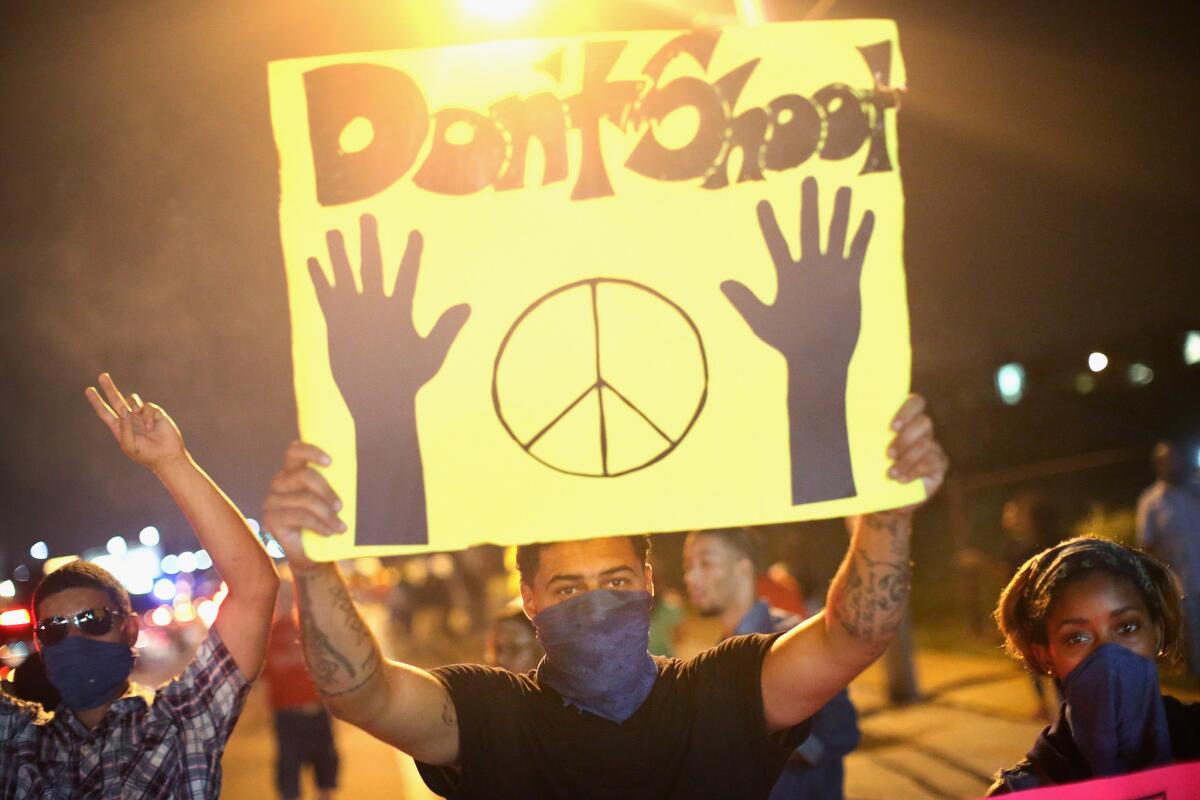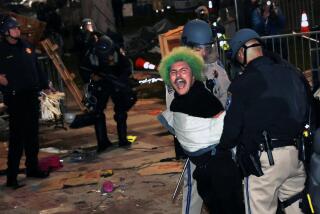Michael Brown shooting in Ferguson becomes an international incident

Reporting from Beijing â Amnesty International has sent monitors to the scene. Palestinians are tweeting advice on how to cope with tear gas. Tibetan monks have showed up to offer prayers. Russian officials, Iranâs official news agency and Chinaâs state-run media are offering lectures on human rights abuses.
What started as a small-town police shooting of an unarmed 18-year-old black man in suburban St. Louis has quickly become an international incident.
As the unrest in Ferguson, Mo., stretches into a second week, scenes of cops in military-like vehicles clashing with protesters are being beamed around the world. A global audience is watching the events with shock and sympathy -- but also a sense of superiority and schadenfreude.
For countries that are often on the receiving end of human-rights lectures from Washington, the situation in Ferguson, Mo. -- the violence, the race troubles and arrests of American journalists -- has presented an irresistible opportunity to turn the tables and accuse the U.S. of hypocrisy.
âThe Ferguson incident once again demonstrates that even in a country that has for years tried to play the role of an international human rights judge and defender, there is still much room for improvement at home,â Chinaâs state-run New China News Agency said in a commentary published Monday, just hours before Missouri Gov. Jay Nixon ordered National Guard troops into the city. âObviously, what the United States needs to do is to concentrate on solving its own problems rather than always pointing fingers at others.â
But Chinese media havenât been devoting as extensive coverage to the Ferguson unrest as have their counterparts in Russia, where the story has been featured prominently on TV news.
Russian officials have taken an even more strident tone -- perhaps not surprising, given the toxic atmosphere between Moscow and Washington of late. Taking note of the unrest in Ferguson, the Foreign Ministry urged âour American partners to pay more attention to restoring order in their own country before imposing their dubious experience on other nations.â
The United States âhas positioned itself as a âbastion of human rightsâ and is actively engaged in âexport of democracyâ on a systematic basis,â but âserious violations of basic human rights and barbaric practices thriveâ in the country, Moscow said in remarks Friday responding to a U.S. report to a United Nations committee on racial discrimination. [Link in Russian]
In Iran on Monday, Ferguson was top news, even overshadowing a magnitude 6.2 earthquake that injured dozens. The Islamic Republic News Agency, the governmentâs official news service, commented that âviolence has become institutionalized in the U.S. in recent years, but since President Obama, the 2009 Nobel Peace Prize winner, came to the White House, the violence has intensified, and now it has erupted against blacks in Ferguson.â
A prominent Cuban news site, Cubadebate, asked in its opinion pages: âIs the Ku Klux Klan coming back with force?â [Link in Spanish]
âNow, as in times past, we can see the brutal segregation and abysmal inequality for blacks and immigrants, in housing, education, work [and] public health, and yet other human rights violations in the so-called most democratic nation in the world,â the column by Cuban journalist Lillian Lechuga concluded.
Even in tiny countries such as Sri Lanka, which doesnât have particularly strained ties with the U.S., the Ferguson situation has become a cudgel to hit back at Washington.
Taking umbrage over a U.S. security warning to Americans on Aug. 8 in connection with an increase in protests and anti-American sentiment in Sri Lanka, the island nationâs Daily News opined: âFor the U.S. to issue a travel warning for Sri Lanka does seem odd at a time when there are race riots in Missouri.â
âThe world is concerned about gun violence and its toll in the U.S., and even though the U.S. president says he is concerned as well, he has not been able to do anything about its epidemic prevalence,â the paper said.
The press in Mexico has provided steady and fairly straightforward coverage of the Ferguson case, but there have been commentaries that condemned police abuses and the treatment of minorities, the kinds of things for which Mexico often gets taken to task.
âIt is worth remembering that in the neighboring country there are frequent cover-ups ⌠of extreme police abuses against black youth,â the leftist daily La Jornada said in an editorial last week.
Gabriel Guerra Castellanos, a former Mexican diplomat and political consultant, wrote in Mondayâs El Universal newspaper:
âThe images are shocking, outrageous. If someone were to tell us this was the old South Africa, or the U.S. South half a century ago, weâd believe it.â [Link in Spanish]
Guerra went on to blame, among many factors, the militarization of urban police forces.
âIn the middle of 2014, a police force that looks more like an invading army is attempting to take over the small community of Ferguson,â he wrote. âThere are police and politicians who prefer a Blackhawk helicopter to patrol cars. Anyone can inflate their childhood fantasies as they wish. But size does matter, and in this case, less is more.â
Scenes of tear gas, Molotov cocktails and flash grenades in Ferguson have surprised many in Egypt, the Palestinian territories and other places where such violence is more common.
A popular blogger in Cairo, who writes under the pseudonym The Big Pharaoh, tweeted a picture from Ferguson and commented: âNope, this is not Egypt or Turkey. This is in the USA.â
Mariam Barghouti, a university student and blogger in the West Bank city of Ramallah, has tweeted out tips for reporters and others in Ferguson who face tear gas from police.
âRemember to not touch your face when tear-gassed or put water on it. Instead use milk or coke!â she wrote last week.
Voicing solidarity with those facing off against police in Missouri, she said a âmade in USA teargas canister was shot at us a few days ago in #Palestine by Israel, now they are used in #Ferguson.â
After taking the highly unusual step of sending human rights monitors to Ferguson, London-based Amnesty International on Sunday called for state and federal probes into Brownâs death, as well as the tactics of Ferguson police. Atop the groupâs U.S. website, its âStand With Fergusonâ campaign gets equal billing with its âGaza Crisisâ and âPanic in Iraqâ briefings.
âAmnesty International has a long and tested history of monitoring and investigating police conduct, not just in foreign countries, but right here at home in the United States,â Amnesty USA executive director Steven W. Hawkins said in a statement. âOur delegation traveled to Missouri to let the authorities in Ferguson know that the world is watching.â
Americaâs persistent problems with gun violence and racial divisions -- in a time with an African American president who advocates stricter gun control -- are perplexing even to its closest allies.
Britainâs Telegraph newspaper published an opinion piece from a U.S. scholar explaining to online readers why âa black president couldnât stop the Ferguson race riots.â
Meanwhile, Germanyâs Der Spiegel interviewed a security expert who opined that what transpired in Ferguson could never happen in Germany. [Link in German]
In the U.S., âthe police quickly appear very militarized. That would never be the case in Germany. We are very restrained in our use of guns; they are weapons of last resort,â said Marcel Kuhlmey, professor in the department of security management at the Berlin University of Economics and Law.
âIn the U.S., it seems to me, the police are far quicker to resort to guns,â he added. âEven at the training stage, there is a much heavier emphasis on shootingâ than in Germany.
Special correspondent Ramin Mostaghim in Tehran and Times staff writer Tracy Wilkinson in Mexico City contributed to this report.
Follow me on Twitter @JulieMakLAT
More to Read
Sign up for Essential California
The most important California stories and recommendations in your inbox every morning.
You may occasionally receive promotional content from the Los Angeles Times.











